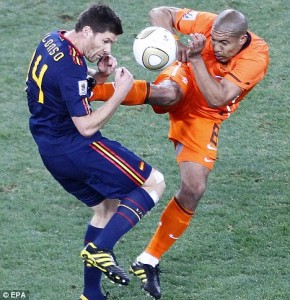You can see the peril of posting something like my last post. I called it not a prediction, but more like a vision. I said that Bastien Schweinsteiger would be the difference-maker in the Champions League final, as a karmic gift from the soccer gods following his heartbreak of the year before.
And I was wrong.
Schweinsteiger certainly played an able match, but the best player on the field on Saturday (perhaps excepting both keepers) was Arjen Robben.
Thus we see the difficulty of interpreting visions.
But perhaps my error wasn’t in my essential hypothesis. Rather it was seeing this:


as Bastien Schweinsteiger shattered. But perhaps I misinterpreted. That look wasn’t “shattered.” That look was “How do I not kill Arjen Robben for missing the game-winning penalty before extra time, so I wouldn’t have had to be in a goddamn penalty shootout in the first place?”
So perhaps the soccer gods doubly bestowed their grace: Robben received redemption, and Schweinsteiger was given reason to forgive.
Robben was simply and uncontroversially excellent. Consider his game-winning goal: He scored not by cutting inside from the right with the ball at his feet but by picking up a pass straight down the middle. He skipped over challenges instead of falling down in a heap. Cutting inside from the right and diving on contact: I and many others see that as Robben’s essential skill-set. (For example, see point four here.) The goal was in some sense so un-Robben-like that you could see it as divinely inspired and ordained.
Overall, it was a beautifully well-played, exciting match. Dortmund had the best of the early part of the match by pressing high and not giving Bayern time or space to get into their flow. Both keepers were excellent–it was amazing that the score remained 0-0 as long as it did. Dortmund fought hard, but after halftime, Bayern adjusted and the question of the second half became, “Can Dortmund prevent the Bayern juggernaut from destroying them?” The answer turned out to be: No, but perhaps with an asterisk.
The main talking point in my own brain over the last few days has been, “Should Dante have seen red for the the foul on Marco Reus that led to the PK?” The talking heads in my brain can see it from all sides. If this had been a normal league match, he gets at least a second yellow–perhaps even a straight red–and is sent off. After all, he did kick Reus in the stomach. You’d be hard-pressed to say a booking wasn’t deserved.
On the other hand, referees frequently are reluctant to send a player off in cup matches, especially finals. Remember this?

That happened in the 28th minute of the World Cup final. In any other match, that’s a straight red: cleats up into Xabi Alonso’s chest. But what was Howard Webb to do? A red card there changes the game completely.
Nicola Rizzoli faced the same choice on Saturday. Every choice (except not calling the foul) had its merits. Had it been outside the box, it would have been a second yellow, without question. That the foul happened inside the box gave Rizzoli some flexibility. It’s not the first time I’ve seen a referee not give a booking when the foul results in a penalty. Award a penalty kick and let the player stay on the pitch: it struck him as a good balance. I’m sure there are thousands of Dortmund fans who are upset about it. I totally see their point. But I see Rizzoli’s as well.
Maybe think of it this way: after two losses in the final in the previous three years, the soccer gods simply decided it was Bayern’s turn to win.